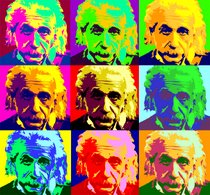“What did the priest say that was so important?”
Georges-Henri Lemaître did the most important things of all, he asked the right question. Just accept for the moment that the universe is expanding, what happens if you think backwards in time?
“I’m not sure I get what you mean?”
Imagine the universe in reverse, shrinking over time. Where would that end up?
“As some really tiny universe?”
Go back a bit further and you don’t even have a universe, just everything squeezed into a dot. This was Georges-Henri Lemaître’s big idea. Working backwards in time he showed that the universe must have started at a place and time when everything in the universe was in a single point. He called this the Cosmic Egg, the moment of the creation. Then on the first day of the universe, 'a day without yesterday', it exploded in the biggest explosion that’s ever been. Georges-Henri Lemaître said it has been expanding ever since.
“Cosmic egg?”
Well I’m glad to say that later on he called it the primaeval atom which sounds a bit more scientific.
“Did you believe him?”
Not even then. I told him 'your calculations are correct, but your grasp of physics is abominable.'
“Ouch!”
The problem with being famous is that people always write down what you say, the smart things and sadly the stupid things too. The next stupid thing I did, what I call my biggest mistake, was to change my own equations with an extra little bit I called the “cosmological constant” to keep the Universe just as it was.
“Did it work?”
Of course not, the Universe didn’t care what I wrote down. Most importantly of all I was wrong.
“So what made you change your mind about the Big Bang?”
Over time as everyone starting talking about the idea and I thought about it more I began to realise he was probably right. I was listening to Lemaître give a talk in
“So a priest discovered how the Universe began?”
Well that Russian mathematician, Friedmann, I told you about started the ball rolling but Lemaître made the world sit up and listen. Still I don’t think Georges Lemaître got the credit he deserved. People seemed to be uncomfortable about mixing up science and religion, even if Georges himself was clear that he was just thinking about the science. The Catholic church seemed to like his ideas as Pope Pius XI promoted him to the Pontifical Academy of Science. The next Pope, Pius XII, went further and embraced the big bang theory as agreeing with the Book of Genesis. The Big Bang became the moment that God said 'Let there be light.'
Even when I was convinced not everyone was. Even when they discovered that the universe was expanding, with all the galaxies flying away from each other, a lot of scientists still thought the idea of a big bang was crazy. The name 'Big Bang' even started as a joke by another astronomer Fred Hoyle, to poke fun at the idea. Fred Hoyle also asked ‘What kind of scientific theory is conceived by a priest and endorsed by a pope?’ If Fred Hoyle had known that a poet had come up with the same idea almost a hundred years earlier he might have lost his reason completely.
“You are trying to tell me that a poet discovered how the universe began?”
Edgar Allen Poe, a poet and writer, put his ideas about the start of the universe in a piece he called







